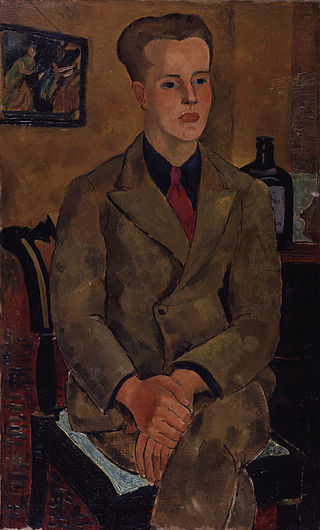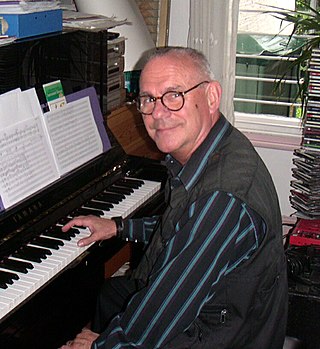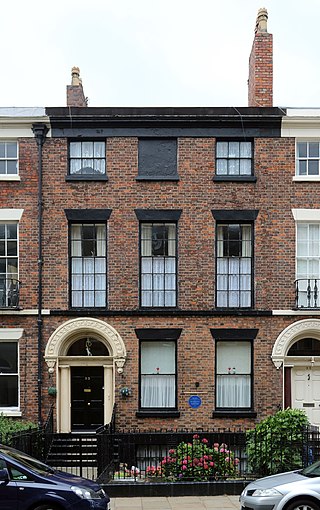Related Research Articles

Leonard Constant Lambert was a British composer, conductor, and author. He was the founder and music director of the Royal Ballet, and he was a major figure in the establishment of the English ballet as a significant artistic movement.
Alan Rawsthorne was a British composer. He was born in Haslingden, Lancashire, and is buried in Thaxted churchyard in Essex.
Peter Racine Fricker was an English composer, among the first to establish his career entirely after the Second World War. He lived in the US for the last thirty years of his life. Fricker wrote over 160 works in all the main genres excepting opera. He was a descendant of the French playwright Racine.
Humphrey Searle was an English composer and writer on music. His music combines aspects of late Romanticism and modernist serialism, particularly reminiscent of his primary influences, Franz Liszt, Arnold Schoenberg and Anton Webern, who was briefly his teacher. As a writer on music, Searle published texts on numerous topics; he was an authority on the music of Franz Liszt, and created the initial cataloguing system for his works.
Randall Carline Swingler MM was an English poet, writing extensively in the 1930s in the communist interest.

The Piano Sonata in B minor, S.178, is a piano sonata by Franz Liszt. It was completed in 1853 and published in 1854 with a dedication to Robert Schumann.

Robin Humphrey Milford was an English composer and music teacher.

John McCabe was a British composer and pianist. He created works in many different forms, including symphonies, ballets, and solo works for the piano. He served as director of the London College of Music from 1983 to 1990. Guy Rickards praised him as "one of Britain's finest composers in the past half-century" and "a pianist of formidable gifts and wide-ranging sympathies".

John White is an English experimental composer and musical performer. He invented the early British form of minimalism known as systems music, with his early Machines.
Charles Edgeworth Cagney Lynch was an Irish pianist who premiered works by several important 20th-century composers.
Bernard (George) Stevens was a British composer who first became known to a wider public when he won a newspaper composition prize for a 'Victory Symphony' in post-war 1946. The broader success was not sustained, but Stevens went on to become a respected composer and teacher at the Royal College of Music, using traditional forms for his compositions while extending his essentially tonal harmonic language towards serialism.

Arthur William Oldham OBE was an English composer and choirmaster. He founded the Edinburgh Festival Chorus in 1965, the Chorus of the Orchestre de Paris in 1975, and the Concertgebouw Orchestra Chorus in Amsterdam in 1979. He also worked with the Scottish Opera Chorus 1966–74 and directed the London Symphony Chorus 1969–76. For his work with the LSO Chorus, he won three Grammy Awards. He was also a composer, mainly of religious works, but also a ballet and an opera.
Mary Lucas, sometimes referred to as Mary Anderson Lucas, was an English composer and pianist.

Edward Aneurin Williams was a British composer and electronic music pioneer, best known for his work on the BBC Television series Life on Earth, and as the creator of Soundbeam. Two of the documentaries he composed scores for were Academy Award winners, including Dylan Thomas (1961), which won an Oscar in 1963, and Wild Wings (1965), which won an Oscar in 1967.
Kyla Betty Greenbaum was a British pianist and composer, the younger sister of conductor and composer Hyam Greenbaum. She gave the first UK performance of Arnold Schoenberg’s Piano Concerto in 1945 and the first of Prokofiev’s Second Piano Concerto in 1955.
Stuart Angus Morrison CBE was an English pianist and teacher who played a significant role in the revival of British music during the inter-war years.
Mabel Lander was British pianist and teacher, mostly remembered today as piano tutor to the Royal Family in the 1930s and 1940s, though her real legacy comes from her teaching several generations of prominent pianists, composers and musicians.
John Austin Sykes was an English composer and music teacher, born in India.

Gordon Green, OBE (1905-1981) was an English pianist and pedagogue. Early on he was appointed Director of the Liverpool School of Music (1935), and subsequently taught at both the Royal Manchester College of Music and at the Royal Academy of Music, London. In 1972, Green received an honorary degree from the University of Liverpool.
James Gibb was an English pianist and teacher. He performed regularly as a solo recitalist, concerto pianist and chamber music player for over four decades, and appeared in many radio broadcasts.
References
- ↑ Who's Who in Music, 5th edition (1950), p. 242
- ↑ Clifton College Magazine (2010), p 22-3
- ↑ Robin Milford Trust
- ↑ Croft, Andy. Conrad Heart, A Life of Randall Swingler (2003), p 33
- ↑ The Musical Times, Vol. 71, No. 1054 (Dec. 1, 1930), p. 1127
- ↑ 'Twin Sisters Play Classics to the Troops', in Picture Post, 15 May 1943
- ↑ 'Mary Peppin', Ballet Rambert Performance Database
- 1 2 Gibbs, James. 'Piano duo: twin touch' in The Guardian, 23 August 1989, p. 39
- ↑ Croft, Andy. Conrad Heart, A Life of Randall Swingler (2003), p 39
- ↑ Trunk Records
- ↑ Colin Chambers. The Story of Unity Theatre (1990)
- ↑ Crodt, Andy. Letter to The Guardian, 7 August 2013
- ↑ Brocken, Michael. The British Folk Revival: 1944–2002 (2017)
- ↑ West, Nigel, Churchill's Spy Files (2018)
- ↑ Richard Knott. The Secret War Against the Arts – How MI5 Targeted Life-Wing Writers and Artists, 1936–1956 (2020)
- ↑ 'London Concerts', in The Musical Times Vol. 93, No. 1311 (May, 1952), p. 223
- ↑ Searle, Humphrey. Quadrille With a Raven: Memoirs, Chapter 11
- ↑ Dutton Epoch CDLX 7160 (2006) reviewed at MusicWeb International
- ↑ Mitchell, Alistair. A Chronicle of First Broadcast Performances of Musical Works in the United Kingdom (2019)
- ↑ Geraldine at 'Mount Pleasant' and Mary at 'Great Lengths'
- ↑ Obituary, The Times, 18 December 1980
- ↑ Obituary, The Times, 22 August 1989, p 16